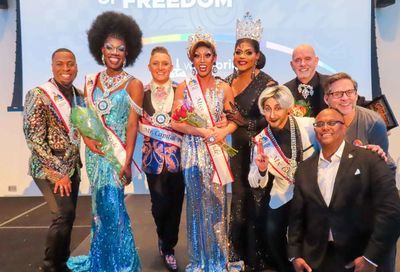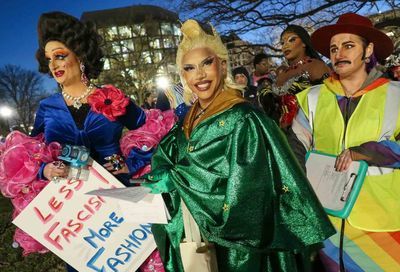School District Bans “Rainbowland” by Dolly Parton and Miley Cyrus
Critics say administrators deemed the song "controversial" because of the rainbow's association with the LGBTQ community.

A first-grade class in Waukesha, Wisconsin, was banned from singing songs about rainbows at their spring concert. Presumably, the district’s conservative school board believes rainbows are too closely associated with the LGBTQ community.
Teacher Melissa Tempel’s class at Heyer Elementary School was slated to perform the Dolly Parton and Miley Cyrus song “Rainbowland,” the lyrics of which imagine a world where everyone is accepted for who they are.
On March 21, Tempel tweeted that her students had been “so excited” to sing the song at the concert, but wrote that it was “vetoed by our administration” with “no reason given.”
“When will it end?” Tempel asked, also tagging the school district’s official account, as well as Parton and Cyrus, the Department of Justice’s Office for Civil Rights, and GSAFE, an organization focused on making schools safe spaces for LGBTQ students.
My first graders were so excited to sing Rainbowland for our spring concert but it has been vetoed by our administration. When will it end? @waukeshaschools @DollyParton @MileyCyrus @mileyworld @gsafewi @CivilRights #publicschools pic.twitter.com/8Na0nETmDw
— Maestra Melissa (@melissatempel) March 21, 2023
She also included a screenshot the lyrics to “Rainbowland” in the post.
The lyrics are: “Wouldn’t it be nice to live in paradise / Where we’re free to be exactly who we are / Let’s all dig deep inside / Brush the judgment and fear aside / Make wrong things right / And end the fight.”
Tempel noted that administrators at Heyer — ostensibly pressured by the school board — also banned the children’s song “The Rainbow Connection” by Jim Henson, which was sung by Kermit the Frog in The Muppet Movie.
However, the next day, in a follow-up tweet, she noted that it was later “unbanned” after parents sent emails to administrators complaining about barring “The Rainbow Connection.”
Rainbow Connection was unbanned today after parents sent emails to admin. Alliance for Education in Waukesha knows how to ally. I don’t know where I’d be without them.
— Maestra Melissa (@melissatempel) March 23, 2023
Sarah Schindler, whose daughter is in Tempel’s class, told the Los Angeles Times that administrators’ decision to deem the songs “controversial” may be related to “a conservative flip” of the school board that took place as part of a larger backlash to the district’s COVID-19 mitigation strategies.
The new conservative board has since adopted new policies that crack down on anything that does not communicate support for conservative or traditional values.
“One of those is a controversial topics policy saying that teachers can’t have any kind of signage that could be deemed political…. Discussion of pronouns with students was another thing that came up. And teachers aren’t allowed to wear rainbows,” Schindler said.
Another parent, Leigh Radichel Tracy, told the Times that the district “has really cracked down on anything LGBTQ” and the fact that songs referencing rainbows are deemed problematic “has not in any way come as a surprise.”
“All that Miley and Dolly are saying is that they want to live in a world that is accepting, with no judgment, and where people can be who they want to be,” Tracy said. “It’s so sad that this is seen as a ‘controversial issue’ by the School District of Waukesha. It’s a song about a beautiful place of acceptance.”
Tempel later tweeted that the district’s censorship of “Rainbowland” was disappointing.
“The ‘Rainbowland’ story is about much more than a banned song,” she wrote. “The result of the political pushback on LGBTQ+ inclusivity and rights in schools is unfolding and it’s tragic.”
The conflation of anything rainbow-colored with the LGBTQ community has angered many conservatives and anti-LGBTQ online trolls.
Earlier this year, the group Pink Floyd was attacked for releasing a 50th-anniversary edition of their 1973 hit album Dark Side of the Moon that featured the number “50” inside a prism and the zero filled in with a rainbow.
Trolls believed the redesigned logo was a form of “virtue signaling” support for the Pride movement and the LGBTQ community. But fans of the ban noted that the logo was an update of the album’s original art, which depicted a prism refracting light to create a rainbow.
Support Metro Weekly’s Journalism
These are challenging times for news organizations. And yet it’s crucial we stay active and provide vital resources and information to both our local readers and the world. So won’t you please take a moment and consider supporting Metro Weekly with a membership? For as little as $5 a month, you can help ensure Metro Weekly magazine and MetroWeekly.com remain free, viable resources as we provide the best, most diverse, culturally-resonant LGBTQ coverage in both the D.C. region and around the world. Memberships come with exclusive perks and discounts, your own personal digital delivery of each week’s magazine (and an archive), access to our Member's Lounge when it launches this fall, and exclusive members-only items like Metro Weekly Membership Mugs and Tote Bags! Check out all our membership levels here and please join us today!




















You must be logged in to post a comment.